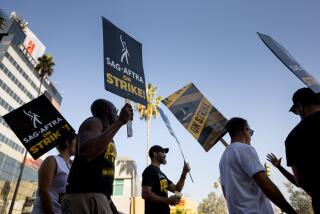Screenwriters’ hard lessons of doing business in Hollywood
After toiling for years in a series of unsatisfying jobs, Robert Rossil finally hit on an idea that he believed could turn everything around: He would become a Hollywood screenwriter.
“I had some downfalls. I thought I had to do something big,” said Rossil, 41, of Palmdale, who has delivered flowers, worked as a care-giver and sold homes. “I always wanted to grow up to be rich.”
Having played soccer as a teen, Rossil thought a script about Uruguay’s stunning upset of Brazil in the 1950 World Cup could be his ticket.
Through a Facebook friend, Rossil stumbled upon a company called Little Studio Films that said it could help people break into show business. He contacted one of its principals, Alexia Melocchi, who he said advised him to find a writing partner and reset the period story into the present day.
Over many months and countless revisions, Rossil whipped “Maracanazo” into a professional-looking,103-page script. But his Hollywood education was only just beginning.
By his accounting, Rossil ended up paying the firm nearly $7,000 to promote “Maracanazo,” borrowing money from a friend and at times sleeping in his car to make ends meet. Nearly three years later, Rossil says he has learned a valuable lesson about how to do business in Hollywood.
“I do believe I have a great story to tell. I believe she believed in the story, but the way she was presenting it was not the way to go,” Rossil said of Melocchi.
Hollywood veterans say Rossil’s experience illustrates the risk of paying anyone in Hollywood upfront fees to get work produced. Professional screenwriters are typically represented by talent agents and managers who get paid only if they sell a script or engage a client for a rewrite of someone else’s screenplay.
“If they’re representing the client, any money that comes to them comes as a commission,” said Richard Walter, an author and co-chair of UCLA’s graduate program in screenwriting. “Never pay anybody to represent you.”
PHOTOS: Hollywood backlot moments
While that may be industry practice, numerous Hollywood neophytes have paid upfront fees for representation, listings on casting websites and talent showcases. In 2009, state legislators passed the Krekorian Talent Scam Prevention Act, which forbids talent representatives from charging fees to secure employment.
Fledgling screenwriters can be desperate for any advantage, however. More than 65,000 pieces of literary material are registered annually at the Writers Guild of America, while fewer than 700 films were released theatrically last year.
Little Studio Films bills itself as a “portal of introduction for visionary artists and companies into Hollywood.” Several former clients said they paid the company thousands of dollars but never got work in return.
Melocchi declined to be interviewed, as did Alexandra Yacovlef, the chief executive of Little Studio Films and Melocchi’s mother. In an email, Yacovlef said that her company has been in business for more than two decades and has “developed a great reputation in the industry with many satisfied partners and clients.”
Little Studio Films has in the past identified itself on its website as “a talent representation” company, and it currently includes a testimonial saying, “I could not have found a better agent to represent my work.”
Yacovlef said in an email that Little Studio Films is not “a talent agency” but “literary managers and entertainment consultants who are also becoming more active as producers.”
VIDEO: Watch trailers featured in the Toronto Film Festival
On its website, Little Studio Films describes itself as a “dynamic, aggressive and rapidly expanding production and management company.” It recently listed 13 “completed” film projects but now only lists nine such movies, with one movie listed twice. It recently claimed to have an additional dozen projects in development, but now lists 11 such projects
But the industry website Studio System says that Little Studio Films has released only one movie, 2004’s “The Drone Virus,” and has completed but not yet released three other films.
What the firm’s website doesn’t say is that Little Studio Films’ office address is that of a Beverly Hills postal box service. Or that its business license is listed as “suspended” by the California secretary of State. The Franchise Tax Board initiated the suspension in October 2003 because Little Studio Films failed to file or pay taxes, said Tami Grimes, a spokeswoman for the board.
Little Studio Films’ services include cutting “coming attractions” previews for movies it is developing. Some such previews contained scenes from other studios’ productions, although that fact wasn’t disclosed in the previews.
A trailer for the Little Studio Films project “Galleon” included snippets from the movies “Into the Blue,” “Titanic” and “The Abyss” and the television series “Surface.” The trailer was until recently available on the company’s website but appears to have been removed in recent weeks.
Rossil, who wrote the soccer movie script, said part of his fee went to finance a demonstration trailer of “Maracanazo” that Little Studio Films said would help sell the film to producers at the Cannes Film Festival. The trailer, which Rossil says Little Studio Films cobbled together with clips from other movies, cost him $3,500 and had the wrong year for the historic upset.
FULL COVERAGE: The Envelope - Awards insider
“She said she would go to the Cannes Film Festival and sell it,” Rossil said of Melocchi. “She was telling me there were people she thought she could take it to.”
In her email, Yacovlef said, “It is not unusual in Hollywood or abroad to cut visual presentation trailers of spec scripts or projects in general.”
The authentic look of the trailers is enhanced by the presence of the official logo of the Motion Picture Assn. of America. But the MPAA said it recently asked Little Studio Films to remove its logo, saying the company didn’t submit its previews for rating approval.
The movie business is built on relationships, and Little Studio Films, founded in 2000, tells prospective clients that Yacovlef and Melocchi have extensive industry experience and contacts.
That wasn’t the experience of Joe Eckardt, a former personal assistant for Nicolas Cage, Cuba Gooding Jr. and Val Kilmer, who said he briefly worked with Melocchi when he was trying to become a filmmaker a decade ago.
“She didn’t have any connections,” said Eckardt, who directed several low-budget films and has his own production company. “Her goal was in keeping me in her little bullpen of directors and connecting me with her bullpen of writers,” Eckardt said. “That was the extent of her work.”
Jim Raymond is another dissatisfied client of Little Studio Films. The Florida retiree, 81, said he paid Little Studio Films about $1,000 annually “for several years” to help sell a movie version of his self-published Korean war novel, “The Gnashing of Teeth.”
“Nothing ever happened,” Raymond said.
Rossil remains hopeful that “Maracanazo” will be made. He said that the project now has the Oscar-nominated cinematographer César Charlone (“City of God”) attached as a director, thanks to a collaboration with a Uruguayan production company. Said Rossil: “We know it can be a remarkable and successful event.”
More to Read
Only good movies
Get the Indie Focus newsletter, Mark Olsen's weekly guide to the world of cinema.
You may occasionally receive promotional content from the Los Angeles Times.







